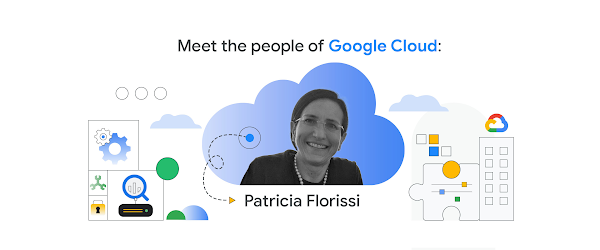Editor’s Note: A native of Recife, Brazil, Patricia Florissi is a Technical Director in OCTO, Google Cloud’s Office of the Chief Technology Officer. OCTO is a global team of senior technologists with experience at large corporations, institutions, and successful startups, who work alongside customers to identify solutions for tough, but transformational challenges.
How has your personal story led you to what you are doing today?
It’s not immediately evident how my personal story led me here, but I am very passionate about what I do at OCTO. My specialty is large computing systems, in particular, federated computations, a superset of federated learning and federated analytics. For me, federated computations are about orchestrating computing across a set of locations, computing on data in place, while preserving the privacy of each participating entity, and sharing only aggregated results with the orchestrator
How does that relate to growing up in Recife in the 1970’s?
I believe that life creates the paths you follow. I also believe that good technology always reflects human experience. My parents were older when they had me, so they were worried they wouldn’t always be around to take care of me. Because of that, I was raised to be independent, mindful, curious and resourceful. I’m driven by my passion for family and learning, and am proud of the role I play in uniting generations.
Nothing about my education was simple. The university I attended in Recife didn’t have a lot of resources, and only a few of us were able to study computer programming. In fact, I had to share a computing textbook with two other students—one of whom became my husband. We learned to program on one of the country’s only personal computers.
Maybe my passion for federation comes from a passion for combining the power of the individual with societal benefit. When people come together, they can achieve bigger, more complex, and more ambitious goals. I’ve seen how the contributions of few, can create something that couldn’t have been achieved otherwise.
Why did you ultimately decide to emigrate to the U.S.?
It was kind of an accident actually. Growing up, everybody in Brazil who wanted to do graduate work in computer science went abroad—so when funding opened up, my husband and I enrolled at Columbia University. After graduating, we went back to Brazil where our twin daughters were born. But a year later, my husband got sick and sought treatment in the States. At that point, I started working for computer companies in the U.S. and joined Google in 2020.
What drew you to Google Cloud?
I love working at Google because the work OCTO does is very complex—complex technology, complex implications for businesses, and complex to execute. We have a great culture for challenging ourselves, learning, and creating by thinking outside the box. As soon as we understand something, we use that as the basis and starting point for learning something else. At OCTO, there is a healthy combination of curiosity and humility.
How is that reflected in your work with customers?
At OCTO, we work with customers to identify their problems and help tackle them. We don’t show up with the answers; we ask questions to understand how they operate, their vision, their challenges and the technology trends that matter most to them. This helps us identify solutions. There’s a lot of joy in the “a-ha!” moment, but it also takes a lot of time and commitment to get there. There are many ups and downs, and it demands a tremendous amount of resilience. But the work is extremely impactful.
How does your specialty—federated computations—impact the world?
Federated computation is a way to process data that is scattered all over the world, without moving that data to a central location. The data stays in place and is computed locally.
A few examples come to mind, such as:
Big retailers who have data in computers across their stores generating images of their shelf that could be collectively used for training ML models to predict “out of the shelf” events before they occur. Federated computations enable the collective analysis without moving data from the store, enhancing privacy while utilizing the compute already dispersed in the stores.
Healthcare providers who collect patient data that could be collectively analyzed but need to be protected because it’s personal information. By analyzing the data in place, federated computations enhance data protection; and
Vehicles, which have become like mobile devices with wheels, collect telemetry data that could be collectively analyzed and used for training predictive maintenance models. Federated computations allow the analysis of the data in-vehicle, enhancing data privacy.
Federated computation is also a positive trend in regards to technology and societal benefit. The world may be headed to increased computing capacity and more data available for analysis. At the same time, the growing concerns with data privacy and data residency, among others, have been leading towards increasing data isolation. It’s an opposition that I’d love to unite and Google gives me the opportunity to work with companies to figure out how to address this. Every day, I wake up and think, “What haven’t I tried yet?,” then I get started.
Cloud BlogRead More


